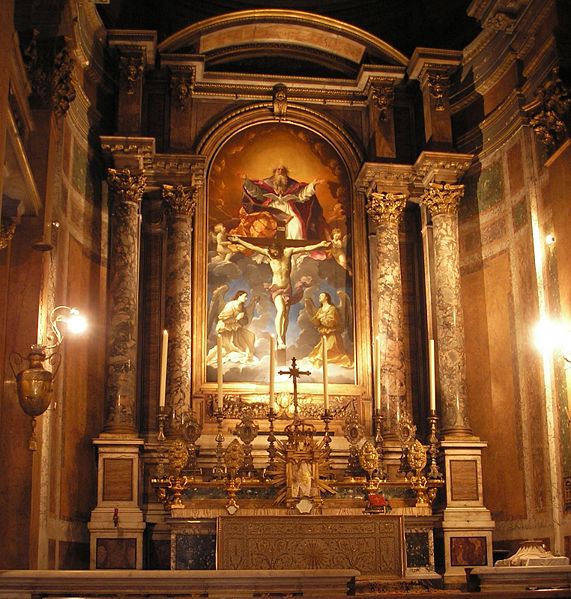Latin Tridentine mass (Missa Tridentina) reborn in Rome
Sunday, July 13, 2008

Some might know that last year Pope Benedict XVI removed the restrictions on the Latin Tridentine mass that had been out of use for quite some time (from Wikipedia):
In 2007, Pope Benedict XVI issued a motu proprio called Summorum Pontificum in which he designated the Tridentine Mass "an extraordinary form of the Roman Rite", as opposed to the ordinary form in normal use. Since then, the 1962 liturgy has often been referred to as "the extraordinary form".Here's a sample of the Latin used in the mass and what it means (also from Wikipedia):
"Confíteor Deo omnipoténti, beátæ Maríæ semper Vírgini, beáto Michaéli Archángelo, beáto Joanni Baptístæ, sanctis Apóstolis Petro et Paulo, ómnibus Sanctis, et vobis, fratres (tibi, Pater), quia peccávi nimis cogitatióne, verbo et ópere: mea culpa, mea culpa, mea máxima culpa. Ideo precor beátam Maríam semper Vírginem, beátum Michaélem Archángelum, beátum Joánnem Baptístam, sanctos Apóstolos Petrum et Paulum, omnes Sanctos, et vos, fratres (te, Pater), oráre pro me ad Dóminum Deum nostrum."Yesterday the Chicago Tribune also had an article on the Latin mass reborn in Rome entitled "A greater sense of the sacred" and what people's reactions to it are. Here's the part of the article I found the most interesting:
(Translation: I confess to almighty God, to blessed Mary ever Virgin, to blessed Michael the archangel, to blessed John the Baptist, to the holy apostles Peter and Paul, to all the saints, and to you, brethren, that I have sinned exceedingly in thought, word, and deed through my fault, through my fault, through my most grievous fault (in Latin, mea culpa, mea culpa, mea maxima culpa). Therefore I beseech blessed Mary ever Virgin ... and you, brethren, to pray to the Lord our God for me.) The servers pray for the priest: "May Almighty God have mercy on you, forgive you your sins, and bring you to life everlasting." Then it is the servers' turn to confess sinfulness and to ask for prayers. They use the same words as those used by the priest, except that they say "you, Father," in place of "you, brethren", and the priest responds with the same prayer that the servers have used for him plus an extra prayer.
By June, with the Vatican's help, this Rome church —The Most Holy Trinity of the Pilgrim church, in English—was designated a personal parish within the local diocese and, as such, open to any Catholic who shared the new mission of reinvigorating the Latin-laced rite.This of course will do nothing to help out with Latin's biggest problem, the lack of modern vocabulary. Even without any real training in Latin it's interesting how Latin now doesn't look so much like a mysterious solemn language so much as another IAL:
The Priestly Fraternity of St. Peter, which for years had celebrated the traditional liturgy as a religious group, was given the authority to launch the old-made-new-again mass.
"Some people say there's a greater sense of the sacred and the transcendental when they hear the mass in Latin," said Rev. Joseph Kramer, who leads the grander services on Sunday as well as daily evening masses. "In some ways, it is less invasive. It lets people pray freely.
"What I sense is there is a lot of silence and people are very concentrated. During the mass, I can feel the concentration. There's no one talking and no one fidgeting."
For some believers in the heart of this Catholic country, the new parish is a blessing to their long-held desire to keep the faith with the liturgy of their childhood. Only a few people after mass said they had trouble following every word. The church helps out a bit: Missals are printed, side by side, in Italian and Latin.
Unlike in the modern liturgy, the priests barely interact with the public. They don't face parishioners—a big visual change from the modern service—and repeat their prayers in near solitude. Still, even younger observers left the service touched by its intimacy. "There's just more solemnity to this," said Roberta Tantalo, a 27-year-old elementary school teacher.
Alessandra Petruccioni, 40, rode a train for a half hour from her suburban home into Rome for a chance to pray in Latin. She was smiling broadly after a mass that resounded with an a cappella finale of Salve Regina.
"I grew up with this as a child and I wouldn't change it for any other mass," Petruccioni said.
mea culpa, mea culpa, mea máxima culpaLooks almost like Ido. That familiarity is a good thing though. As has been said before regarding teaching Latin:
But Fr Foster said the techniques used to teach Latin were outdated. "You need to present the language as a living thing," he said. "You do not need to be mentally excellent to know Latin. Prostitutes, beggars and pimps in Rome spoke Latin, so there must be some hope for us."





0 comments:
Post a Comment